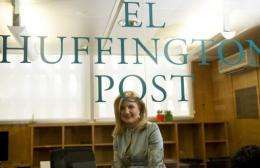Arianna Huffington, president and editor-in-chief of the Huffington Post Media Group, pictured at the Huffington Post office in Madrid. El Huffington Post opened in Spain on Thursday, poking fun at the government's handling of the economic crisis in typically irreverent style for the growing news and blogging empire.
El Huffington Post opened in Spain on Thursday, poking fun at the government's handling of the economic crisis in typically irreverent style for the growing news and blogging empire.
Founder Arianna Huffington, who launched The Huffington Post in the United States in 2005, flew into Madrid to help prepare the first edition.
"Quiet Please" headlined the home page, over a photo collage of a surprised Prime Minister Mariano Rajoy with an apparently confused finance team -- the economy minister with his eyes closed and the budget minister in the midst of an earnest explanation.
In an interview with AFP ahead of the launch, Huffington said launching in the middle of a recession in a country at the heart of the eurozone debt storm was actually good timing.
It was a time to try new models, and a time when people need a platform to be heard, she said.
Huffington believes the business, which employs eight journalists and two interns in an equally held joint venture with leading daily El Pais, can turn a profit, too.
El Pais sells the advertising and the two partners split the revenue, she said.
"I think you can make money," said the 61-year-old founder of the online paper, which now has the US edition, two more in Canada, one in France, one in Britain and one in Spain.
"First of all, we operate like a startup without high overheads, that is the reason why in every country we are launching in partnership with an established media organisation," she said.
"We bring the template of the Huffington post, the technology. Our editors are here training the local journalists but it is very much a local operation, it is run by Spanish journalists."
Although the news outlet is "beyond left and right" because it aims to look at issues of the day without polarizing the discussion, she said, it still has strong views, for example on Spain and the eurozone's austerity policy.
"We have a feeling and an editorial position, which is that it is insane. It is the definition of insanity doing the same thing again and again and expecting different results," she said.
Greece's austerity measures had only aggravated its debt by reducing growth and tax income, Huffington added.
"We are in the grip of a destructive ideology at the moment. We are not really practicing sound economic policy."
The Huffington Post, bought by Internet group AOL in February 2011, has 500 journalists and editors in the United States, she said, recalling that it won a Pulitzer prize for a 10-part series on the lives of returning veterans.
"We are two things really, we are a hybrid, we are a journalistic enterprise that honours all of the traditions of journalists and we are a platform that has thousands of bloggers provided that they clear a quality bar. It is not a free-for-all."
She denied being annoyed by US President Barack Obama's barb at the White House Correspondents' Dinner in April, when he mocked the Pulitzer saying: "There is no-one else out there linking to the kinds of hard hitting journalism that HufPo is linking to every single day."
Huffington took it as a compliment.
"Any time the president of the United States mentions your Pulitzer it is a good thing," she said.
In September, she said, the Huffington Post launches an edition in Italy in partnership with Gruppo Editoriale L'Espresso.
"Then we are in conversations in Germany, in Brazil, in India, in Japan. We have multiple conversations and negotiations going, so we will see what is next after Italy. We don't know yet."
(c) 2012 AFP























